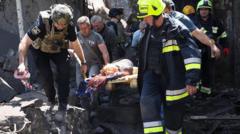Despite Russian claims of normalcy in Mariupol, locals describe a city still ravaged by war, facing shortages and propaganda. Amid these challenges, resistance efforts emerge to document and counter the occupiers.**
The Harsh Reality of Life in Mariupol: Voices of Resistance Amid Ruins**

The Harsh Reality of Life in Mariupol: Voices of Resistance Amid Ruins**
Ukrainian residents of Mariupol provide a stark contrast to Russian narratives, revealing ongoing hardships and a resilient spirit of defiance.**
Ukrainian residents insist that the narrative pushed by Russian media regarding Mariupol's recovery is far from the truth. "What they're portraying is simply fairy tales," states John, a resident of the city under Russian control, whose identity we have concealed due to fears of reprisal. He highlights efforts to mask the damage: "The main streets have been touched up for cameras, but in reality, much of the city remains in ruin. Many still live in apartments that are barely standing."
Since its capture following intense bombardment three years prior—a pivotal moment in Russia’s aggression against Ukraine—Mariupol has been portrayed through a conflicting lens of destruction and supposed recovery. While some Russian influencers publicize videos that showcase a revitalized city, conversations with multiple residents tell a much grimmer story.
Elderly resident Olha Onyshko, who escaped to Ukraine’s Ternopil, reflects on the city's lost beauty, stating, "Mariupol is now diseased. Only the central square has seen reconstruction while debris remains, and bodies were improperly dealt with." Residents face extreme water shortages, with supply irregularities leading to unsafe drinking water, and reports indicate that even basic medicines are in short supply.
The city's deputy mayor-in-exile, Serhii Orlov, attributes the water crisis to damage inflicted during the war, explaining that the sole reservoir is insufficient for the current population, thereby leaving many with undrinkable water.
Harsh living conditions are compounded by propaganda targeting children in schools, where distorted narratives about Ukrainian territories being liberated by Russia are being taught. “It's a reprogramming,” describes John, after noting intimidation tactics used against teachers who oppose such lessons. Meanwhile, Russian celebrations of victory have seen a reintroduction of Soviet traditions, with children participating in military parades, a stark contrast to previously held Ukrainian values.
Yet, there exists a resilient spirit among many, evidenced by clandestine resistance movements within the city. Activists risk their lives nightly to spread messages of support and document Russian military activities. James, a member of one such group, describes his need to operate under constant risk, capturing secret information regarding troop movements and military logistics to relay to Ukrainian forces.
Despite the palpable tension, these acts of defiance are crucial in maintaining hope. “We are not looking for peace at any cost,” asserts John. “We yearn for liberation.” The reality of life in Mariupol showcases not only the struggle for survival amid devastation, but also the undying commitment to resist and reclaim sovereignty over their homeland.




















